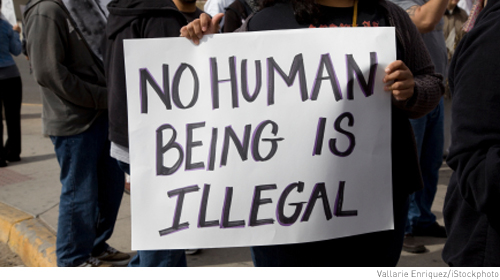
Secure Communities, the Obama administration's favored immigration enforcement program, has a track record that includes the unlawful detention of U.S. citizens. Antonio Montejano, for example, was held for four days after an arrest stemming from his children's handling of store merchandise. He remained in custody despite repeatedly proclaiming U.S. citizenship and arrived back home to his worried 8-year-old son, who asked "'Dad, can this happen to me too because I look like you?'"
Mr. Montejano's far-from-unique experience underscores the need for thorough oversight of S-Comm, which has been widely criticized. On Good Friday, the Department of Homeland Security Office of Inspector General issued two reports on S-Comm. S-Comm requires state and local law enforcement agencies to submit fingerprints of all arrested persons they book into jail to Immigration and Customs Enforcement. A year ago, Rep. Zoe Lofgren requested the OIG investigation. She cited evidence that Congress, states and localities were subjected to an ICE bait-and-switch turning voluntary S-Comm participation into mandatory conscription, without apparent legal authority.
The reports' cursory content is shockingly shoddy (see here and here). The OIG omits analysis of S-Comm's devastating effects on families and people with no or minor criminal convictions; S-Comm's complicity with racial profiling; S-Comm's detention of U.S. citizens and other lawful residents; and S-Comm's flouting of law enforcement experts' opinion that the program harms trust between police and witnesses or victims of crime.
The OIG refers to Congress's — and ICE's own — intent that S-Comm "[p]rioritize enforcement actions to ensure apprehension and removal of dangerous criminal aliens." Congress (and ICE later on) defined "criminal alien" to mean only convicted persons. That's why Gov. Pat Quinn of Illinois objected last year that "less than 20 percent of those who have been deported from Illinois under the program have ever been convicted of a serious crime." To test S-Comm's effectiveness, the OIG assessed a few hundred "random" S-Comm cases, 0.002 percent of ICE's annual queries. Those included more than double ICE's reported proportion of Priority 1 (serious felony) offenders. The OIG's sample is also skewed because it omits S-Comm "no-matches," where fingerprints fail to match ICE's databases. "No-match" cases can still result in deportation, but based on its limited sample the OIG concluded that "officers took enforcement actions consistent with ICE's policy" in 97 percent of cases.
S-Comm's realities are far different. First, ICE's policies include prosecutorial discretion when individual equities are present, which the OIG does not address. Yet 46,486 parents of U.S. citizen children were deported in the first half of 2011, many as a result of S-Comm. At least 5,100 American children were sent to foster care. Second, S-Comm has removed only 27 percent Priority 1 individuals, not the 71 percent indicated by the OIG's sample. Nationwide, more than 56 percent of S-Comm deportees had either no convictions (26 percent) or one or two misdemeanor convictions (30 percent). In Travis County, Texas, for example, S-Comm deported more than 1,000 people after arrests for "minor infractions such as traffic tickets or public intoxication."
S-Comm creates an incentive for police to make minor or pretextual arrests. Even if someone is later cleared of wrongdoing, S-Comm can still lead to their deportation. Racial profiling results: Latinos make up 93 percent of S-Comm apprehensions, although they are only 77 percent of the undocumented population. ICE partners with S-Comm jurisdictions which the Department of Justice has concluded engage in biased policing practices against Latinos and communities of color — plus states that have enacted racial profiling laws targeting immigrants, like Alabama and Arizona — yet none are investigated in the OIG's reports. Racial profiling affects more than undocumented persons. The ACLU of Southern California recently presented four cases of U.S. citizens detained because of S-Comm, and lawsuits brought by U.S. citizens are pending in Pennsylvania and Illinois (a class action). The OIG reports, however, didn't look into these cases.
As Rep. Lofgren said on Friday, the OIG avoided serious questions about S-Comm: "Does the program . . . ensnare victims and others with no criminal history? Is it susceptible to racial profiling? Does it ultimately undermine community policing efforts—leaving us all less safe?" The OIG chose not to tackle these issues; it is now up to the Government Accountability Office's pending review to produce the first rigorous analysis of S-Comm's ongoing failures. Sadly, in the interim, an opportunity was lost to remove a primary source of immigrants' fear that interactions with law enforcement — even after a 911 call — can mean racial profiling and the division of families through deportation.
Learn more about Secure Communities: Sign up for breaking news alerts, follow us on Twitter, and like us on Facebook.
Stay informed
Sign up to be the first to hear about how to take action.
By completing this form, I agree to receive occasional emails per the terms of the ACLU's privacy statement.
By completing this form, I agree to receive occasional emails per the terms of the ACLU's privacy statement.
